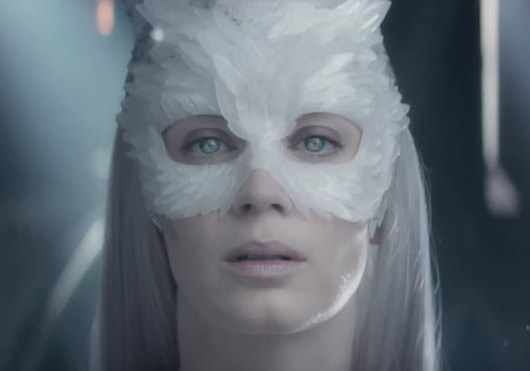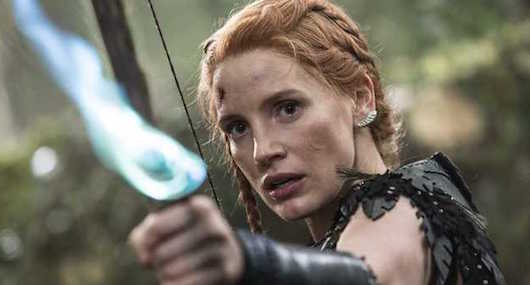 FILM
FILM In Which Nothing Blows Up To Our Considerable Chagrin
 Tuesday, August 1, 2017 at 7:10AM
Tuesday, August 1, 2017 at 7:10AM 
A Colder War Than Usual
by ALEX CARNEVALE
Atomic Blonde
dir. David Leitch
115 minutes
 Lorraine Broughton (Charlize Theron) is fond of ice baths, brunettes, and cigarettes. She smokes seventeen of them in Atomic Blonde, which is quite the feat considering she never buys them and none of the other characters arranged in Berlin in 1989 ever offer her one. When two people enjoy smoking in the way that Lorraine and Percival (James McAvoy) do, you would think they would have a lot in common. At first, Percival believes they will.
Lorraine Broughton (Charlize Theron) is fond of ice baths, brunettes, and cigarettes. She smokes seventeen of them in Atomic Blonde, which is quite the feat considering she never buys them and none of the other characters arranged in Berlin in 1989 ever offer her one. When two people enjoy smoking in the way that Lorraine and Percival (James McAvoy) do, you would think they would have a lot in common. At first, Percival believes they will.
By the end of Atomic Blonde, McAvoy and Theron have only had about three conversations with each other. Even though I appreciate the idea that they were simply not romantically inclined towards each other, Atomic Blonde runs so far away from this possibility that you wonder if the two actors ever saw each other on set. They don't touch at all during the movie's running time, at least not on the skin. Once, Percival takes her jacket.
McAvoy is a deft and exciting performer, and his supercharged supporting role as an English spy gone rogue is essential to this moody nothing-piece, because without him the only bomb going off would be the alarm at the conclusion of this feature-length nap.

Ms. Theron looks dramatically better as a brunette, or even bald. Blonde hair makes her look a bit goofy, really, but director David Leitch is keen to distract us from this fact by placing Lorraine in her undergarments as often as possible. She is nude in no less than five scenes, which has to be some kind of record. Despite this titillation, Atomic Blonde is rather dull, although that is not to say it does no attempt to make things interesting.
The film's central sequence is a set piece where Lorraine and Percival attempt to transport an East German man (Eddie Marsan) and his family to the West. Unfortunately, Leitch's budget did not really accomodate a crowd scene larger than 100 people. The action gets more chaotic in an apartment building nearby, where Lorraine fights for her life against members of the KGB. This is the closest we ever get to believing she is in serious trouble on her mission, but the drama is rather toned down because of the fact a frame story makes it quite clear she's alive and well except for a black eye.

For a spy thriller, absolutely everything is what it seems in Atomic Blonde. The four other contacts Lorraine makes in Berlin are a KGB agent, a British agent, a French agent named Delphine (Sofia Boutella) and a Swede named Merkel (Bill Skarsgård). None of them, including McAvoy are anything different from what they appear to be. This has the consequential effect of meaning that Lorraine never has a moment where she is taken by surprise, and as an audience neither do we.
More troubling is the absolute lack of a feast for the senses present in Atomic Blonde. Sure, the movie is pretty to look at, which is a major and important concern. But none of the characters ever smell, taste, touch or hear anything in each other's voices outside of a moment where Lorraine is critiqued for her poor German. How could anybody tell? She only speaks one line in the language.

The music of Atomic Blonde is an endless churn of 80s pop. Except for when Lorraine is fighting, she constantly has this lame soundtrack purring around her, with the resonance of the lyrics striking the rare thematic aspects present in the story: e.g. "Voices Carry" and "Father Figure." The songs are all way too familiar to be dropped into these mien, a fact that Leitch amusingly confesses to when he has Lorraine watch an MTV clip of Kurt Loder investigating the phenomenon of sampling.
Kurt Loder seemed absolutely ancient to me when he was on television, and Atomic Blonde does a good job of turning Berlin's atmosphere into something that can be called modern when viewed through this future lens. In a few fleeting moments, we get a sense of Lorraine as a kind of disturbed alien temporarily visiting on a planet of beings that might as well be ants to her: she is that far above them. This is possibly true.
Alex Carnevale is the editor of This Recording.














































